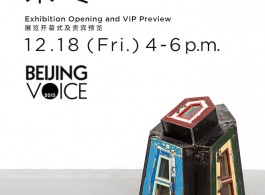“Surplus value” is value that people recognize beyond existing value. It is overlooked value. It is not about exploitation, but about discovery and creation. It is the “usefulness of uselessness.”
Song Dong
Pace Beijing is pleased to present “Beijing Voice: Song Dong Surplus Value” from December 19, 2015, to February 27, 2016, with an opening reception to the public on Friday, December 18 from 4 to 6 pm. As the sixth installment of Pace Beijing’s annual project “Beijing Voice”, this exhibition will feature Song Dong’s latest series, Surplus Value, a conceptual exploration of everyday “discarded things”.
As a leading international artist, Song Dong this year presented a retrospective exhibition of over twenty years of his art at the Groninger Museum in the Netherlands, and Kunsthalle Dusseldorf in Germany, while also taking part in the Venice Biennale, Triennial Brugge, and important exhibitions at art museums and institutions around the world. This October, he held the dual space solo exhibition Sketch in Hong Kong. Now, Pace Beijing will close out the year by presenting the artist’s powerful creativity and artistic ideas in this upcoming solo exhibition.
Song Dong’s new work Surplus Value can be seen as a continuation of the Waste Not and Wisdom of the Poor series. In Waste Not, Song Dong reaffirmed the value of everyday objects through contemporary artistic means. This series of artworks imbued with a strong sense of Chinese domesticity elicited a powerful reaction around the world in an affirmation of the universality of the artist’s vision. In Wisdom of the Poor, he wove his own individual memories together with those of the masses to present the creativity that bursts forth from poverty.
In Surplus Value, the latest installment of this trilogy, he further explores the aesthetic value of everyday objects. This series of works alters garbage and refuse. When these items are discarded, they lose their original use value. Here, the artist strips away the external form and internal function of these everyday objects to reveal uniquely delightful abstract installations.
Song Dong’s explorations approach the quotidian at a minimal distance as they uncover the most valuable and meaningful layers to everyday life and create a channel for interchange between art and life. This channel may appear to be constructed within the external transformation of spatial settings and forms, but it actually comprises a transformation of internal recognition. Song Dong describes this transformation by coining the paradoxical term “Abstract Realism.” Here, “abstract” can be seen as a verb, as the artist immerses himself in every specific detail of real life, and then abstracts and refines them into more essential insights.
The title of this new series, Surplus Value, comes from Marxist political economics, but unlike this cold, absolute theory, an emotional thread has always run through Song Dong’s own values coordinates as he uses artistic means to handle his relationships with objects, with family and with life. In Waste Not, the first installment of this trilogy, Song Dong used art to help his mother, the two of them completing this continued artwork together. In this way, art was officially “drawn into” his family, becoming a ubiquitous presence in their lives. This implies that the relationship between art and life is no longer limited to the creative stage, that it has become a part of the everyday.
Song Dong’s “trilogy” presents a form of wisdom from the streets. This living intelligence is the source of the “lightness” that shines in his works. This lightness softens the “intentional” elements of realist artworks, lifting the burden of art with his signature attitude of “If you don’t do it, it’s a waste of nothing. If you do do it, it’s a wasted effort, but a wasted effort is still doing.” Only in this way can one truly approach the ideal state of art as life and life as art.
Song Dong (b. 1966, Beijing, China) has emerged from a strong Chinese avant-garde performing arts community and developed into a significant contemporary art figure in the progression of Chinese conceptual art. His work ranges from performance and video to photography and sculpture, which explores notions of impermanence and the transience of human endeavor. Song Dong’s work is included in numerous public collections including the Museum of Modern Art, US; The Metropolitan Museum of Art, US; Tate Liverpool, UK; The Guy & Myriam Ullens Foundation Collection, Belgium; M+ Museum Hong Kong, China, among others.



